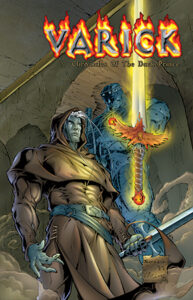If you’re an experienced writer, or pro here to fine tune your work and pick up a few tips, crack on. (Feel free to skip this article.)
For the newer folks to writing, I wanted to take a moment to properly introduce this writing craft page.
In the end, there are no rules in ‘writing’… but believe it or not, THERE ARE rules to being You…
Yeah, you read that right.
I could tell you. “never open a story with a dream sequence,” but then you might know of a really famous, successful comic series that did just that.
Did they pay the right people to pull that off? Use some sort of witchcraft? Have a hotline to the Black Knight satellite?
Nope.
The writer of that story circumvented traditional writing etiquette, because that rule didn’t define him. Part of his uniqueness as a writer is the way he sees the world through abstract images and symbolism. The way he thinks in non-linear time.
The writing craft section of this site lays out a whole bunch of writing stuff, NOT to show you how you must do things, but to help you figure out who you are as a writer, where your personal strengths and weaknesses lie and ultimately, what rules define YOU.
(coincidentally, if you have any hope of writing for a living, make a big mental note that what works best for you, isn’t always what feels most comfortable, at least not at first anyway, but I digress).
When I work with folks with my editor or consultant hat on, they often hear me talking about a story’s potential.
In fact, I rarely shut up about story potential and there’s a big reason why:
For nearly thirty years, without fail, the vast majority of less experienced writers miss their potential when developing new stories.
Literally 99% of the time.
This isn’t some marketing gimmick I’m throwing at you to keep you reading. This is real-world experience talking.
This is one of the most depressing aspects of being an experienced story guy. Nothing irks me more than seeing a story land on my desk, a real gem of a story buried in mud and grime, that the writer never spends the time to uncover.
Wasted potential.
I can’t stress the importance of story potential enough.
Your story’s potential sets everything that will become of your story, both creatively and practically (in a business sense).
HITTING THE POTENTIAL OF YOUR STORY is often the difference between success and failure, BUT EVEN WORSE than failure, the difference in a story stuck in obscurity, manipulating you into kicking a dead horse for years to come.
The TRUTH is, most writers, even writers with tons of words under their belt, don’t spend the time, REALLY, digging deep to figure out WHY they’re writing what they’re writing…
Most writers jump in and do what they do.
Write.
Most, WRITE TO PLOT.
Casually working to support their approach with some of the other writing mechanics that come more natural to them. (Often some measure of theme and solid character development.)
When you take this approach, you can almost NEVER see the real molten core, the essence, or heart of the story.
IT WILL ALWAYS ELUDE YOU.
Hidden behind the mechanics that come natural to you… And further obscured by your personal closeness/familiarity to the story.
Closeness/familiarity = If you’ve developed any kind of story, you know story is an iceberg. The script exposes only the tip. Everything you know about the story (as the creator or writer), that’s the massive chunk underwater.
Unfortunately, readers only get to see the tip.
I could give you million examples of missed story potential from client work over the years (names redacted of course to protect the innocent)… instead allow me to give you one from my own.
One of the first comics I wrote back in the ’90s (when I was greener than an emerald out of a leprechaun’s ass), Varick: Chronicles of the Dark Prince.
 The high-fantasy story focused on a prince turned into a monster by an evil sorcerer. The sorcerer figured once the prince was this horrible creature, he’d be locked away, or killed, leaving him to take possession of the kingdom. The plan worked, until monster prince escaped and to make a long story short, reclaimed part of his humanity.
The high-fantasy story focused on a prince turned into a monster by an evil sorcerer. The sorcerer figured once the prince was this horrible creature, he’d be locked away, or killed, leaving him to take possession of the kingdom. The plan worked, until monster prince escaped and to make a long story short, reclaimed part of his humanity.
The prince now a human-demon hybrid with a host of dark powers, would struggle to reclaim his throne.
Truth is, when I wrote this story, I was writing to plot.
My focus as a writer was “cool fantasy shit.” The series was actually a team story, with a cast of five or six unique fantasy individuals. My goal was writing one big, ongoing high-fantasy D&D adventure comic focusing on the cool cast I had swimming around the bottom of my story iceberg.
I’m sharing this because it’s a great example missing a story’s potential.
At the time I never bothered to figure out why I was really writing this story.
The prince that became a half-demon, linked up with a handful of other outcasts, instead of fleeing or turning to a life of crime, he and his friends set off to make things right, along the way helping other folks in trouble (Fantasy A-team?)… What I was really trying to write, was a story about losing everything and being put in a position where everything pushes you into a survival mode. Where selfish and underhanded acts are expected of you… but something deep inside refuses to do so. Something bigger rises up and says, “no, even put into the worst of possible positions, I will be my best self–compassionate, righteous, patient, etc. That I will be better than the situation life has put me in and carry myself with the highest honor and morality.”
Compare that insight and the writing goals that might directly rise from it, to writing “cool fantasy shit.”
Which do you think has greater potential?
Even as a novice, when I wrote Varick, my subconscious had some sort of inkling what it was doing. But when the subconscious works without the conscious, your story will never reach its full potential. And more often than not, it becomes a muddled mess.
Want another example of fundamentals affecting story potential? Click here to jump to a bonus example.
Story Potential Ripples Like a Stone Thrown into a Pond
My Varick example focuses more on the fundamental building blocks of the story.
I pointed out how understanding why you’re doing what you’re doing can have a drastic difference on the focus of your story. But it doesn’t go into the specific expressions of the concepts I mentioned in the example.
Newer writers miss reaching the full potential of their story 99% of the time, because why you’re doing it (which so many newer writers never bother exploring), is only part of the equation.
A story’s potential lies in the effective excellence of every single element.
In fact, it’s not unusual to find a story from a novice writer that has the core fundamentals pretty well put together, but with just one or two things missing, misaligned, or miscommunicated, the execution of the story totally falls apart.
Or more accurately, misses its full potential.
Being able to assess all the elements of story at their core levels, is part innate skill (like any other part of art), but also, a big part of it comes from editing and assessing other peoples’ work for decades.
Over the years, I’ve come to realize being to close to your own work is the story potential killer. Only when working with other peoples’ work (for years), do you force and train your mind to observe story. To become impartial to it. To see it for what it really is; what works, what really works, and what doesn’t work at all.
While every writer can develop this skillset over time, it speaks to the advantage of hiring a good editor, someone experienced in your genre, to help you see what’s hiding right in front of you and discover your story’s full potential.
If you can hire an experienced story expert like myself to help you, fantastic! You’ll be leaps and bounds ahead of your competition…
but I’ve been indie comics for decades and I know a lot of newer writers just can’t manage that.
The intent of the articles on this site are to provide you with the second best alternative, to stress the importance of getting your fundamentals right and help you find the rules that define you as a writer.
Which all lead to helping you build your scripts and writing career on an unshakable foundation that supports you for years to come. ▪
About the Author —
Nick Macari is a full-time freelance story consultant, developmental editor and writer, working primarily in the independent gaming and comic markets. His first published comic appeared on shelves via Diamond in the late 90’s. Today you can find his comic work on comixology, Amazon, and in select stores around the U.S. Visit NickMacari.com for social media contacts and news on his latest releases.
Bonus example:
Was recently helping someone with a sci-fi story. Writer was working on familiar, tropey ground.
But for his Villain, he put in a redemption arc. So by the end of the story, the Villain is redeemed… and he’s actually, not that bad.
First. The writer did not have the vision/experience to understand how difficult it is to push a Villain redemption arc. He was totally blind to the problems it caused throughout the entire narrative and it caused serious problems.
** This alone was crushing his story potential in a big way… but there’s more. **
The hero struggled with some themes of vengeance and corruption… but like the villain, in the end, found his own redemption.
While this approach could work and wasn’t inherently wrong… The real story this dude was trying to tell, was where the hero became totally corrupted and the true villain of the story while the villain found complete redemption, becoming the hero. A total reversal of main character roles.
It took me a single pass reading the client’s outline to see the real story he was trying to develop.
Of course he had no idea.
The writer’s subconscious was trying to tell this story. The creative genius was there in him— but he kept getting in his own way!
He was all jumbled up, totally distracted by plot and world building. Because he couldn’t see things clearly, he was nowhere near reaching the true potential of his story.
When I pointed this out to him, he said it was like a veil lifted and the entire project came to him in a new light.
Not only did this understanding push the story toward it’s full potential, but the floodgates opened for the writer. Where he was stumped and had to really struggle to write, suddenly, everything flowed at an almost unstoppable pace.
